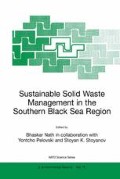Abstract
Material recycling (MR.) is attractive for society because it reduces the use of resources and the amount of waste generated for disposal. Although theoretically the environmental benefits of MR are obvious, currently it is not being applied widely. The reason for the slow development of MR is economic — it simply costs more to recycle than to use virgin raw materials. This situation will continue as long as the costs of environmental impacts are not fully integrated into the cost calculations of all the stakeholders such as producers, converters, users, recyclers, and waste operators.
Since the end of the war prices of both raw materials and energy have steadily declined in real terms, albeit with some temporary exceptions caused by political or supply problems. Cheap raw materials, combined with mass production techniques, have made cheap final products possible. The low intrinsic cost of landfilling, which is still a low-eost solid waste management option, makes waste disposal considerably cheaper thanreuse or recycling. This is mainly because selective collection, handling, sorting and intermediate storage of waste for MR is labour-intensive. Furthermore, the quality of goods manufactured from recycled materials is often much lower thanwhen virgin material is used in production. Consequently, they have fewer market outlets compared to goods made with virgin raw materials.
The development of MR is also being thwarted by the absence of a scale-effect, limited outlets and low demand, as well as insufficient prospects for research. In practice only those materials (such as gold, lead, iron and steel, and some other metals), whose properties are not degraded by recycling, are now being recycled in large quantities. Large quantities of some of the lower-quality recycled mass products, such as hygienic paper for which there is a strong demand, are also being produced. There is thus a ‘vicious circle’ operating to inhibit the wider development of MR.
Thus, a strategic management to promote MR depends on the creation of structurally sound economic conditions. It is argued that MR would attract necessary investment only when the aforementioned ’vicious circle ‘ is replaced by a ‘virtuous circle ‘ characterised by a growing scale-effect that would ensure regular and reliable supply of goods of the right quality and quantity made from recycled materials. It is also argued that a strategic management plan to favour MR should comprise the following: (a) an integrated approach to MR to facilitate the involvement of operators from both virgin and recycling systems: (b) creation of stable conditions for long-term investment in progranunes to promote MR; and (c) inputs and actions from competent authorities to facilitate the creation of the ‘virtuous circle ‘ via demand-side management (in order mainly to create a guaranteed minimum demand and for demonstrating MR).
Access this chapter
Tax calculation will be finalised at checkout
Purchases are for personal use only
Preview
Unable to display preview. Download preview PDF.
References
Dishovski, M, Vergiev, D and Staynov, M (2000), ‘The national waste management programme of Bulgaria’, in Sustainable Solid Waste Management in the Countries of the southern Black Sea Region, (Ed.) B. Nath, Kluwer Academic Publishers, Dordrecht, The Netherlands, pp. 103–112.
RDC-Brus sels and Coopers & Lybrand (1997), Eco-balances fo r Policy-making in the Domain of Packaging and Packaging Waste, Report to DG XI, Commission of the Europ ean Communities, Brussels.
Bibliography
Brisson, I (1992), ‘The Government’s recycling policy: optimal recycling?’, Integrated Waste Management, No. 15, pp. 13–14.
Buekens, A (1992), Recycling, VUB Press, Free University of Brussels, Belgium.
Clean Japan Centre (1991), Law for the Promotion and Utilisation ofRecyclable Resources, Tokyo, Japan.
Clean Japan Centre (1991), Recycling Guide, Tokyo, Japan.
Cooke, F (1992), ‘Recycling review’, Special Report, European Plastics News, pp. 17–32.
Dawson, A, Gaskell, D and Brown, C (1996), Affordable Recycling — Building a Strategy, Institute of Groc ery Distribution, IGD Business Publication, Letchmore Heath, United Kingdom.
Diaz, L.F, Savage, G.M and Golueke, C.G (1982), Resource Recovery from Municipal Solid Waste, Volume I (Primary Processing): ISBN 0-8493-5613-X; and Volume II (Final Processing): ISBN 0-8493-5614-8, published by CRS Press Inc., USA.
Pears Plastics Ltd. (1991), Strategies for Plastic Recycling of Post-Consumer Waste, Report of the Pears Plastic Recycling Company, Houthalen, Belgium.
Porter, W.J (1995), The American Recycling System, Report of the Waste Policy Centre, Leesburg, Virginia, USA.
Vinci, Perrier (1996), ‘Le project Poluphenix, presentation du project Polypnenix’, Direction Environnement, Internal Document.
World Resources Foundation (1995), Materials Reclamation Facilities, Technical Brief, Technical Information Sheet from the Residua & Warmer Bulletin.
VDI (1999), VDI-Richtlinie: VDI 2343 Blatt 4, Recycling of Electrical and Electronic Products, VDI Handbuch. For more information: E-mail: rili:@vdi.de
Author information
Authors and Affiliations
Editor information
Editors and Affiliations
Rights and permissions
Copyright information
© 2000 Springer Science+Business Media Dordrecht
About this chapter
Cite this chapter
De Caevel, B., Buekens, A. (2000). Materials Recycling — Strategic Management And Conditions For Economic Viability. In: Nath, B. (eds) Sustainable Solid Waste Management in the Southern Black Sea Region. NATO Science Series, vol 75. Springer, Dordrecht. https://doi.org/10.1007/978-94-010-0940-9_8
Download citation
DOI: https://doi.org/10.1007/978-94-010-0940-9_8
Publisher Name: Springer, Dordrecht
Print ISBN: 978-0-7923-6681-2
Online ISBN: 978-94-010-0940-9
eBook Packages: Springer Book Archive

